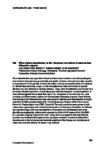Use este identificador para citar ou linkar para este item:
http://www.alice.cnptia.embrapa.br/alice/handle/doc/1036659| Título: | Effect of plant domestication on the rhizosphere microbiome of common bean (Phaseolus vulgaris) . |
| Autoria: | PÉREZ-JARAMILLO, J. E.  MENDES, R.   RAAIJMAKERS, J. M.   |
| Afiliação: | J. E. PÉREZ-JARAMILLO, Netherlands Institute of Ecology; RODRIGO MENDES, CNPMA; J. M. RAAIJMAKERS, Netherlands Institute of Ecology. |
| Ano de publicação: | 2015 |
| Referência: | In: RHIZOSPHERE, 4., 2015, Maastricht. Stretching the interface of life: abstracts... Maastricht: Wageningen University & Research Centre and the Netherlands Institute of Ecology, 2015. Ref. 118. |
| Páginas: | 282 |
| Conteúdo: | Plant domestication was a pivotal achievement for human civilization and subsequent plant improvement increased crop productivity and quality. However, domestication also caused a strong reduction in the genetic diversity of modern cultivars compared to their wild relatives. It is known that plants rely, in part, on the rhizosphere microbial community for wreowth, development and tolerance to (a)biotic stresses. Hence, plant domestication events may have adversely affected the bacterial diversity of the rhizosphere of two wild relatives, three landraces and three modern cultivars of common bean (Phaseolus vulgaris). These different lines belong to the Mesoamerican bean gene pool of Colombia and were selected amongst more than 37,000 accessions kept in the Genetic Resources Program of the International Centre for Tropical Agriculture (CIAT, Colombia). The eight accessions were grown in both native and in agricultural soils collected in the province of Antioquia (Colombia). At different plant growth stages, DNA was extracted from rhizospheric soil and bacterial taxonomic diversity was analysed by metagenomic sequencing of the V3-V4 region of the 16S rRNA. Our Approach of going ?back to the roots? using native soils togheter with wild relatives provides new fundamental insights in host genotype-mediated recruitment of beneficial microbes and in the functional and metabolic potential of the rhizosphere microbiome of native soils and wild relatives of modern crop cultivars. |
| Thesagro: | Feijão Rizosfera Phaseolus Vulgaris |
| Tipo do material: | Resumo em anais e proceedings |
| Acesso: | openAccess |
| Aparece nas coleções: | Resumo em anais de congresso (CNPMA)  |
Arquivos associados a este item:
| Arquivo | Descrição | Tamanho | Formato | |
|---|---|---|---|---|
| 2015RA068.pdf | 40,61 kB | Adobe PDF |  Visualizar/Abrir |









